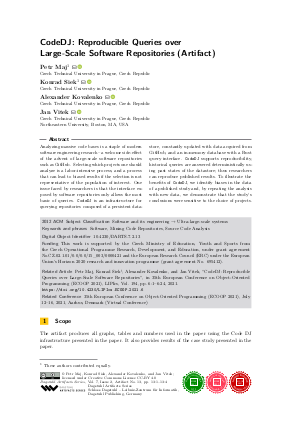CodeDJ: Reproducible Queries over Large-Scale Software Repositories (Artifact)
Authors
Petr Maj  ,
Konrad Siek¹
,
Konrad Siek¹  ,
Alexander Kovalenko
,
Alexander Kovalenko  ,
Jan Vitek
,
Jan Vitek 
-
Part of:
Issue:
Special Issue of the 35th European Conference on Object-Oriented Programming (ECOOP 2021)
Part of: Volume: DARTS, Volume 7 (ECOOP 2021)
Part of: Conference: European Conference on Object-Oriented Programming (ECOOP)
Part of: Journal: Dagstuhl Artifacts Series (DARTS) - License:
 Creative Commons Attribution 4.0 International license
Creative Commons Attribution 4.0 International license
- Publication Date: 2021-07-06
Artifact Description

PDF
DARTS.7.2.13.pdf
- Filesize: 0.6 MB
- 4 pages
Document Identifiers
Subject Classification
ACM Subject Classification
- Software and its engineering → Ultra-large-scale systems
Keywords
- Software
- Mining Code Repositories
- Source Code Analysis
Metrics
- Access Statistics
-
Total Accesses (updated on a weekly basis)
0Document
0Metadata
Artifact
DARTS-7-2-13-artifact-84f3bd083b289355e20112dd26cf5887.tgz
(Filesize: 40.78 GB)
MD5 Sum:
84f3bd083b289355e20112dd26cf5887
(Get MD5 Sum)
Abstract
Analyzing massive code bases is a staple of modern software engineering research – a welcome side-effect of the advent of large-scale software repositories such as GitHub. Selecting which projects one should analyze is a labor-intensive process, and a process that can lead to biased results if the selection is not representative of the population of interest. One issue faced by researchers is that the interface exposed by software repositories only allows the most basic of queries. CodeDJ is an infrastructure for querying repositories composed of a persistent datastore, constantly updated with data acquired from GitHub, and an in-memory database with a Rust query interface. CodeDJ supports reproducibility, historical queries are answered deterministically using past states of the datastore; thus researchers can reproduce published results. To illustrate the benefits of CodeDJ, we identify biases in the data of a published study and, by repeating the analysis with new data, we demonstrate that the study’s conclusions were sensitive to the choice of projects.
Cite As Get BibTex
Petr Maj, Konrad Siek¹, Alexander Kovalenko, and Jan Vitek. CodeDJ: Reproducible Queries over Large-Scale Software Repositories (Artifact). In Special Issue of the 35th European Conference on Object-Oriented Programming (ECOOP 2021). Dagstuhl Artifacts Series (DARTS), Volume 7, Issue 2, pp. 13:1-13:4, Schloss Dagstuhl – Leibniz-Zentrum für Informatik (2021)
https://doi.org/10.4230/DARTS.7.2.13
BibTex
@Article{maj_et_al:DARTS.7.2.13,
author = {Maj, Petr and Siek¹, Konrad and Kovalenko, Alexander and Vitek, Jan},
title = {{CodeDJ: Reproducible Queries over Large-Scale Software Repositories (Artifact)}},
pages = {13:1--13:4},
journal = {Dagstuhl Artifacts Series},
ISSN = {2509-8195},
year = {2021},
volume = {7},
number = {2},
editor = {Maj, Petr and Siek¹, Konrad and Kovalenko, Alexander and Vitek, Jan},
publisher = {Schloss Dagstuhl -- Leibniz-Zentrum f{\"u}r Informatik},
address = {Dagstuhl, Germany},
URL = {https://drops.dagstuhl.de/entities/document/10.4230/DARTS.7.2.13},
URN = {urn:nbn:de:0030-drops-140371},
doi = {10.4230/DARTS.7.2.13},
annote = {Keywords: Software, Mining Code Repositories, Source Code Analysis}
}
Author Details
Funding
This work is supported by the Czech Ministry of Education, Youth and Sports from the Czech Operational Programme Research, Development, and Education, under grant agreement No.CZ.02.1.01/0.0/0.0/15_003/0000421 and the European Research Council (ERC) under the European Union’s Horizon 2020 research and innovation programme (grant agreement No. 695412).
Related Article
- Petr Maj, Konrad Siek¹, Alexander Kovalenko, and Jan Vitek, "CodeDJ: Reproducible Queries over Large-Scale Software Repositories", in 35th European Conference on Object-Oriented Programming (ECOOP 2021), LIPIcs, Vol. 194, pp. 6:1-6:24, 2021. https://doi.org/10.4230/LIPIcs.ECOOP.2021.6
References
- T. F. Bissyande, F. Thung, D. Lo, L. Jiang, and L. Reveillere. Orion: A software project search engine with integrated diverse software artifacts. In International Conference on Engineering of Complex Computer Systems, 2013. URL: https://doi.org/10.1109/ICECCS.2013.42.
- Roberto Di Cosmo and Stefano Zacchiroli. Software Heritage: Why and How to Preserve Software Source Code. International Conference on Digital Preservation, 2017. URL: https://hal.archives-ouvertes.fr/hal-01590958.
- Robert Dyer, Hoan Anh Nguyen, Hridesh Rajan, and Tien N. Nguyen. Boa: A language and infrastructure for analyzing ultra-large-scale software repositories. In International Conference on Software Engineering (ICSE), 2013. URL: http://dl.acm.org/citation.cfm?id=2486788.2486844.
- Davide Falessi, Wyatt Smith, and Alexander Serebrenik. Stress: A semi-automated, fully replicable approach for project selection. In International Symposium on Empirical Software Engineering and Measurement (ESEM), 2017. URL: https://doi.org/10.1109/ESEM.2017.22.
- Jesus M. Gonzalez-Barahona, Gregorio Robles, and Santiago Dueñas. Collecting data about FLOSS development: The FLOSSMetrics experience. In International Workshop on Emerging Trends in Free/Libre/Open Source Software Research and Development (FLOSS), 2010. URL: https://doi.org/10.1145/1833272.1833278.
- Georgios Gousios and Diomidis Spinellis. GHTorrent: GitHub’s data from a firehose. In Michael W. Godfrey and Jim Whitehead, editors, Working Conference on Mining Software Repositories (MSR), 2012. URL: https://doi.org/10.1109/MSR.2012.6224294.
- Crista Lopes, Petr Maj, Pedro Martins, Di Yang, Jakub Zitny, Hitesh Sajnani, and Jan Vitek. Déjà Vu: A map of code duplicates on GitHub. Proc. ACM Program. Lang., (OOPSLA), 2017. URL: https://doi.org/10.1145/3133908.
- Hitesh Sajnani, Vaibhav Saini, Jeffrey Svajlenko, Chanchal K. Roy, and Cristina V. Lopes. Sourcerercc: scaling code clone detection to big-code. In International Conference on Software Engineering (ICSE), 2016. URL: https://doi.org/10.1145/2884781.2884877.
